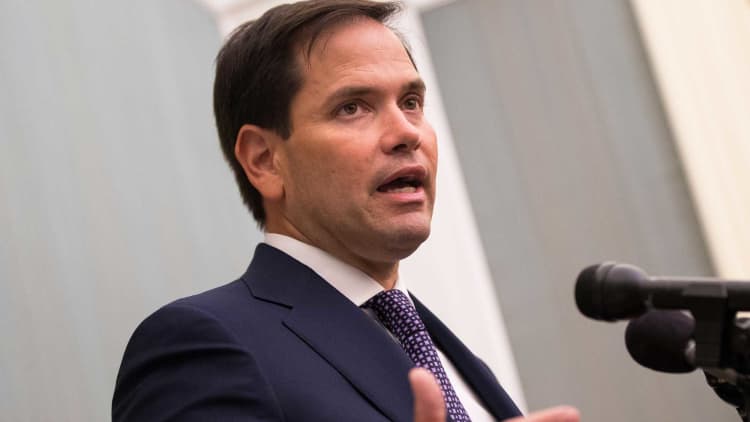
The government needs to ensure that federal worker retirement dollars are not being invested in China, Sen. Marco Rubio told CNBC on Wednesday.
"There really is no such thing as private companies in China," said Rubio, who unsuccessfully sought the 2016 Republican presidential nomination. "They're all, to some extent, instruments of state power. The first question is whether U.S. investment dollars should be propping up these companies that are actively seeking to undermine U.S. economic and national interests."
The Florida Republican and Sen. Jeanne Shaheen, D-N.H., wrote a letter last month to the Federal Retirement Thrift Investment Board, urging the agency to reverse a decision to use the MSCI All Country World ex-U.S. Index as the benchmark for a public pension fund. China stocks represent about 8.5% weighing in that index.
In the change to the Thrift Savings Plan's international stock fund, set for implementation next year, Rubio argued on "Squawk Box" that $50 billion in federal employee retirement assets would be invested in the Chinese Communist Party.
"The FRTIB's decision to track this MSCI index constitutes a decision to invest in China-based companies, including many firms that are involved in the Chinese Government's military, espionage, human rights abuses, and 'Made in China 2025' industrial policy, and therefore poses fundamental questions about the board's statutory and fiduciary responsibilities to American public servants who invest in federal retirement plans," Rubio and Shaheen's letter said.
The two senators are not alone in calling for the Thrift Savings Plan change.
The "Committee on the Present Danger: China," backed by China hawks including former Trump advisor Steve Bannon and hedge fund manager Kyle Bass, is getting behind the effort, scheduling an event for Thursday to express opposition to the TSP pegging. The advocacy group launched earlier this year.
China's stock market, which has been growing in recent years, is often underrepresented in global indexes. That's led to the index providers slowly increasing Chinese assets in their weightings.
The Rubio-Shaheen letter comes as economic tensions are already high between Washington and Beijing. The world's two largest economies have been entrenched in an escalating trade war for the past year, with each country imposing import tariffs on billions of dollars' worth of each other's goods.
Ahead of high-level trade talks next month, a slight reprieve came Wednesday when China's Ministry of Finance announced plans to exempt 16 types of U.S. products from additional tariffs as of Sept. 17.
The FRTIB had no comment but said it was reviewing the letter.


